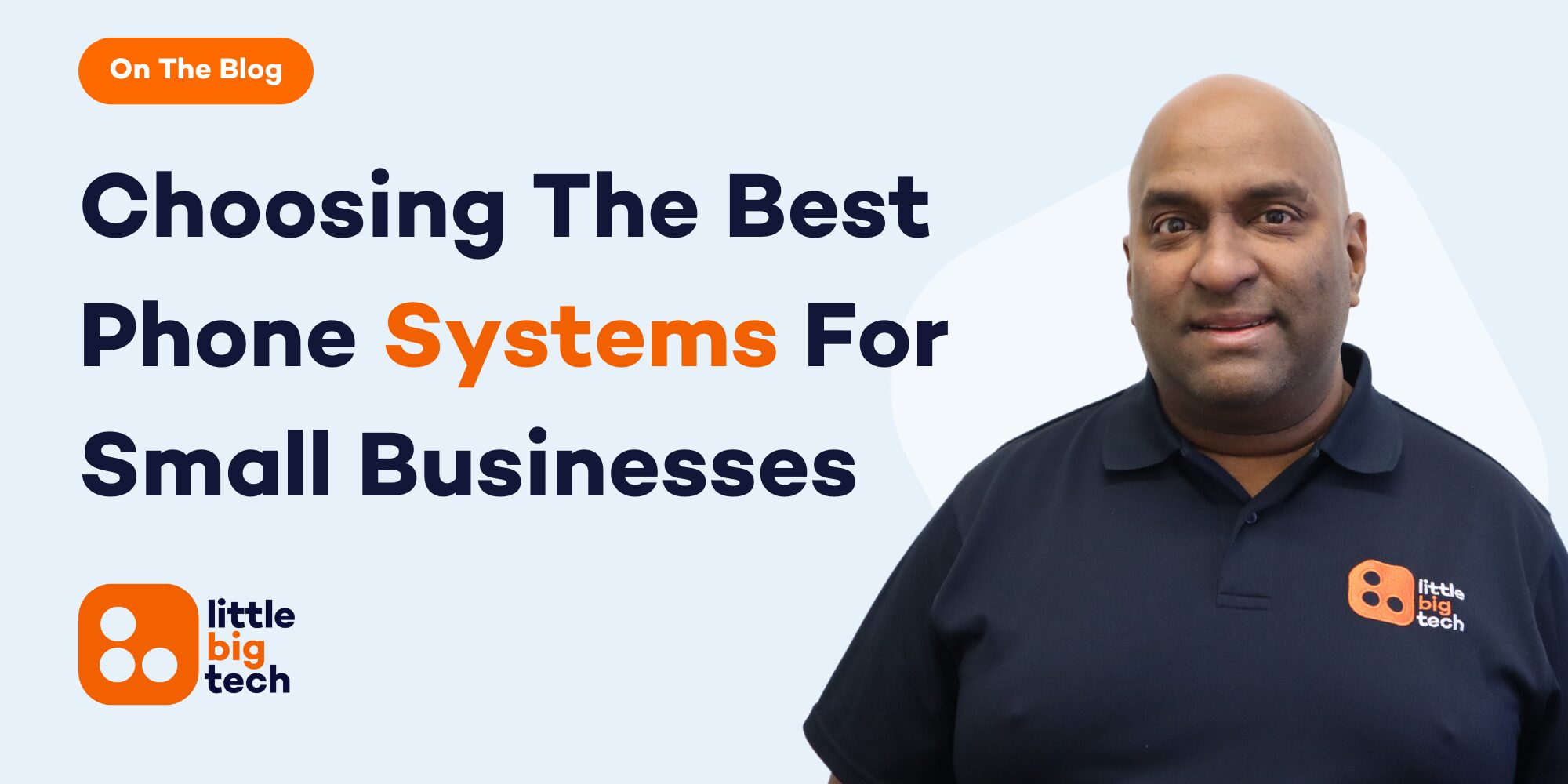- Why Phone Systems Still Matter For Small Businesses In 2025
- What Are the Best Phone Systems Used by Small Businesses Today?
- Features That Actually Matter (And Ones You Can Ignore)
- Mistakes Small Businesses Make When Choosing A Phone System (And How To Avoid Them)
- Comparing Popular Phone Systems Used By Small Businesses
- Why Little Big Tech Is The Smart Choice For Small Business Phone Systems
Why Phone Systems Still Matter For Small Businesses In 2025
When running a company, the last thing you want is to miss an important call or lose a sale because of a poor connection. That’s why the best phone systems used by small businesses are more than just a nice-to-have. In 2025, a reliable, flexible phone system is still one of the most important tools a small business can invest in.
Even with emails, instant messages, and video calls now part of everyday business, traditional voice calls remain vital. They give clients and customers that human touch, especially when resolving issues or closing a deal. This means small businesses must choose a phone system that can keep up not just work most of the time, but every time.
The choice isn’t just between mobile or desk phones anymore. Today, small businesses have access to a range of options including cloud-based VoIP systems, hosted PBX setups, and more. But with so many features and providers on the market, how do you know which one actually suits your needs? And more importantly, how do you make sure you’re not overspending on things you’ll never use?
This guide breaks everything down in simple term. We’ll look at the types of phone systems small businesses actually use, the features worth paying for, and the common traps to avoid. If you’re serious about improving how your business talks to the world, keep reading.
What Are the Best Phone Systems Used by Small Businesses Today?
Small businesses in 2025 have more phone system options than ever before, and the best choice often depends on how a business works day to day. From startups to growing offices, different setups offer different advantages. Let’s break down what small businesses are actually using right now and why.
1. VoIP (Voice over Internet Protocol): This is by far the most popular choice. Instead of using landlines, VoIP systems send calls over the internet. Services like RingCentral, 3CX and others offer cloud-based platforms that are cheaper and more flexible than older phone systems. Many businesses choose VoIP because it allows team members to take calls on their mobiles or laptops, even when working remotely.
2. Cloud Phone Systems: These are a type of VoIP but with added features like call recording, team messaging, and integration with CRM tools. They’re perfect for businesses that want to scale without dealing with hardware or high setup costs. Cloud systems are easy to manage and don’t require an in-house IT team.
3. On-Premise PBX Systems: These are still used by some businesses with a physical office that needs a dedicated phone system. They involve hardware installed at the business premises and often come with upfront costs and long-term maintenance. They work best for companies with stable infrastructure and specific compliance needs.
4. Hybrid Systems: A mix of traditional and VoIP systems, hybrid setups are often used during a transition period. For example, a business might keep desk phones but route calls through the internet for lower costs and flexibility.
5. Mobile-First Systems: Some businesses, especially those without a fixed office, now use mobile apps that offer full phone system functionality. These are ideal for tradespeople, consultants, or teams constantly on the move.
When deciding which type is best, it’s important to consider the size of your team, your internet reliability, and whether you need features like call forwarding, voicemail-to-email, or video calling. The best phone systems used by small businesses today are the ones that adapt to your business, not the other way around.

Features That Actually Matter (And Ones You Can Ignore)
When small businesses shop for a phone system, it’s easy to get overwhelmed by a long list of features. But not every feature adds value. Some can even slow your team down or add unnecessary cost. This section highlights the features that really matter and the ones you can usually skip.
1. Must-Have Features That Make a Difference:
Call forwarding and routing: These are essential if you want customers to reach the right person quickly. Whether someone’s working from home or out on a job, calls can be routed automatically without frustrating hold times.
Voicemail to email: This saves time and keeps records tidy. Messages are sent straight to your inbox, making it easier to keep track of missed calls and respond quickly.
Call reporting and analytics: These help managers track call volumes, missed calls and peak times. It’s especially useful if you want to improve your team’s responsiveness and customer experience.
Auto-attendant (digital receptionist): Customers don’t like being left hanging. A clear menu that directs them to the right place makes your business feel professional even if you only have a small team.
Mobile and desktop apps: In 2025, your team should be able to answer calls and check voicemails from anywhere. A good phone system works across devices, not just desk phones.
CRM integration: If you use customer relationship tools like Salesforce or HubSpot, linking your phone system means faster service and fewer mistakes. You can see who’s calling and pull up their details right away.
2. Features That Sound Good But Rarely Help:
Fancy on-hold music and custom ringtones: While these can be fun, they don’t improve business performance. They’re nice extras but not worth paying extra for.
Too many user permissions and admin controls: These can become a hassle for small teams. Keep things simple so that everyone knows how to use the system with ease.
Overcomplicated conference call tools: If you already use Zoom or Teams, your phone system doesn’t need to replace them. Redundant tools just confuse your team.
In short, focus on what improves customer calls, keeps things moving fast, and helps your team stay connected. Anything else is likely just fluff that you don’t need.
Mistakes Small Businesses Make When Choosing A Phone System (And How To Avoid Them)
Many small businesses fall into common traps when choosing a phone system. These mistakes can cost time, money, and customers. Here are the biggest error and how to avoid each one with smart, simple decisions.
1. Choosing Based On Price Alone:
Some business owners pick the cheapest option without checking what they’re actually getting. A low price often means fewer features, weak support, or poor sound quality. You don’t need to overspend, but always check that the service matches your team’s needs, now and in the future.
2. Not Thinking About Growth:
It’s easy to buy a system that only fits your business today. But what happens when you hire more staff or expand to another location? A good system should grow with you. Look for flexible plans, easy user additions, and cloud-based options that don’t require extra hardware.
3. Forgetting About Support:
Tech support matters. When something goes wrong, you need help fast. Some providers only offer online chat or ticket systems. If your phones go down, waiting hours for help isn’t good enough. Choose a company that offers proper phone support, especially during your business hours.
4. Ignoring Mobile Needs:
In 2025, many teams work remotely or on the move. If your phone system only works on a desk phone, you’re already behind. Make sure your team can take calls from laptops and mobiles just as easily especially if you’re offering hybrid or field-based roles.
5. Skipping A Test Run:
Some providers offer demos or trial periods, but small businesses don’t always take advantage. Always test how the system works for your daily tasks. Can you transfer calls easily? Is the app clear? Does it work when internet speeds are low? A trial can reveal hidden issues.
6. Forgetting To Train Staff:
Even the best phone system is useless if your team doesn’t know how to use it. Once you install your system, give staff simple training. Show them how to transfer calls, check voicemails, and change their settings. Clear use equals better service for your customers.
Avoiding these mistakes means choosing a phone system that works from day one and keeps working as your business grows.

Comparing Popular Phone Systems Used By Small Businesses
Choosing the best phone system for your small business means knowing what’s available. Each type of system offers different benefits depending on your size, goals and team setup. Here’s a clear comparison of the most popular systems used by small businesses today.
1. VoIP (Voice Over Internet Protocol)
This is now the most common type used by modern small businesses. VoIP uses your internet connection instead of traditional phone lines. You can make and receive calls from anywhere using a mobile app, desk phone, or computer.
Pros:
-
Lower cost than landlines
-
Easy to scale
-
Remote working friendly
-
Loads of features (voicemail to email, call routing)
Cons:
-
Needs reliable internet
-
Call quality can drop with weak connections
Best for: Remote or hybrid teams, startups, growing businesses
2. Traditional Landline Systems (PSTN)
These are the old-style systems that use copper wires. They’re becoming less common and are being phased out in many areas.
Pros:
-
Simple to set up
-
Works without internet
Cons:
-
Expensive to maintain
-
Limited features
-
Hard to scale or move
Best for: Businesses in areas with poor internet, or those with very basic needs
3. Virtual Phone Systems
These systems use your existing devices, like mobiles or laptops, and route calls through a central number. There’s no physical phone system on-site.
Pros:
-
Cheap and easy to set up
-
Perfect for very small teams or one-person businesses
-
Great flexibility
Cons:
-
Lacks advanced features
-
Call quality depends on mobile networks
Best for: Freelancers, solo business owners, side hustles
4. Cloud-Based Business Phone Systems
These are full systems hosted online by a provider. You manage everything through an app or web portal and have all the tools of a big business.
Pros:
-
Full feature set
-
Easy to manage
-
Can grow with you
-
Ideal for remote teams
Cons:
-
Needs training to get full value
-
Monthly subscription fees
Best for: Small businesses ready to grow, or with flexible work setups
Each of these systems has its place. The right one depends on how your team works, how much support you need, and how often you’re on the move.
Why Little Big Tech Is The Smart Choice For Small Business Phone Systems
Choosing the best phone system for your small business doesn’t need to be complicated. After looking at the options from VoIP and landlines to cloud-based setups it’s clear that small businesses need a system that’s reliable, flexible, and built for the way modern teams work.
At Little Big Tech, we don’t just offer phone systems. We take the time to understand how your business runs day to day. Whether you work from home, run a shop, or manage a growing team, we’ll recommend the system that fits how you work, not just what’s popular.
We provide everything from simple setups of best phone systems used by small businesses for solo traders to full-featured VoIP solutions for growing businesses. Our systems come with tools that make life easier, like call forwarding, voicemail to email, hold music, and mobile apps that let you take calls on the go.
But what makes us really stand out is our ongoing support. We’re here to help when you need it. No call centres, no long wait times, just local help from real people who know their stuff.
If you’re not sure where to start, we’ll talk you through it. No pressure, no tech jargon. Just honest advice to help you pick the system that gives your business the best chance to grow.
Let’s get your phone system working properly. Call us today on 03333 055 331 or email info@littlebigtech.co.uk to chat about what you need. We’re ready when you are.









